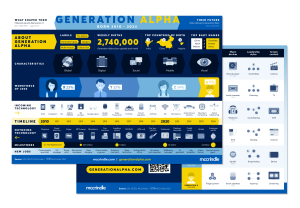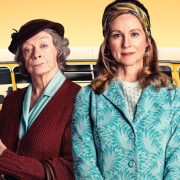Are Generation Alpha ‘Up-Ageing’ or ‘Delay-Ageing’?
By: McCrindle
Is 8 or 28 the new 18? Will Generation Alpha, today’s emerging generation mature later or earlier?
18 was the common age of becoming an adult in traditional western society but things have changed when it comes to the rites of passage that mark the transition from childhood into adult independence.
For Generation Alpha, key rites of passage will be marked by owning their own first phone, starting their first side hustle and renting their first place before finishing tertiary studies.
There are indicators showing that today’s youngest generation, Generation Alpha, have greater digital independence at a younger age than previous generations. Yet at the same time they will also delay some of the traditional life markers of becoming an adult such as getting married, having children and moving out of home. In an era of adulting memes, increasing digital literacy and the longevity boom where people are now forecast to live into their 80s and work towards their 70s, let’s take a look at the factors for and against today’s emerging generation up-aging (getting older younger) verses delay-ging (delaying key life markers of adulthood).
The Traditional Rites of Passage Into Adulthood
The key markers at the age of 18 for Baby Boomers, Generation X and even Generation Y included the right to vote, the legal drinking age and obtaining a license to drive. Gaining independence from parents through these means allowed a young adult to emerge from adolescence and make their own decisions in areas such as where they’d live and travel, what career they’d pursue, what relationships they’d invest into and the social and religious ideologies they’d reject or adhere to. Essentially, freedom from parental restrictions emerged physically, socially and politically for older generations at this key moment with a car licence often being the way to escape and find new experiences (even it if was in Mum and Dad’s Holden commodore!).
As a Gen Y myself, getting a licence involved a transition from Learning permits at 16 to provisional levels at 17-19 until gaining a full licence at 20 after 100+ hours of driving practice. Ask a Baby Boomer how much practice they had to do to get a licence and you’ll often get some wild story of learning to drive on a long remote drive or learning to drive on a farm.
But what does it mean to ‘become an adult’ in today’s era? Generation Z now are drinking less and are more health conscious than previous generations. They also own fewer cars due to living in urban areas where younger generations are more likely to rent and rely on active and public transport. So, what markers still matter and are today’s emerging generations growing up earlier or later?
Upaging Now a Tween Experience, Occurring Digitally
It is common for children aged between 9 to 11 years of age in the UK and US to have a smart phone, while 80% of children aged 12-13 in Australia have a mobile phone. This means that most students entering high school are doing so with their own personal smart device. Interestingly, this is the era when children become teenagers and shift their source of influence from parents to peers. This is now occurring at the same that time they possess their own digital device that gives them 24 hour access to peers on social media platforms. But even well before high school, one quarter of children in Australia aged 6-7 have access to or own a phone, meaning that earlier digital independence (accessing information, social and virtual experiences and communities using their own phone or their parents) is commencing for today’s children at a younger age than in the past. This is a generation of digital natives who are learning to navigate apps, online communities and a plethora of diverse worldviews and opinions in video content powerhouse platforms like YouTube and TikTok. This digital experience is helping develop and inform today’s emerging generation at a younger age. And while access to information for Generation Y’s was still available, reading the Britannica encyclopaedia was far less addictive and stimulating than endless doom scrolling on TikTok or YouTube.
‘Delay-ging’ – When Young Adults Delay Traditional Life Mmarkers
For Generation Y and the generation to follow them, Generation Z, the ability to find independence IRL (in real life) is harder, even though digital independence is occurring earlier. The challenge to do further post-graduate study is present as a highly educated generation now look to get further credentials to help them stand out in the workforce and secure a higher salary. The need for greater earning potential is a key driver as Gen Z hope to one day own their own home, despite the rising tide of renting later being a strong reality in Australia as the dream of home ownership fades as a result of the affordability challenge where household income is not keeping up with property price growth. But there’s other delayed life markers occurring too, more than just renting for longer. Australia’s population today are getting married later, which now occurs at 29.4 years of age for females and 30.8 for males. Along with a later age of new parents at 31.7 for females and 33.7 for males. Four decades ago, this was 25 years of age for Baby Boomers, indicating that reproducing and the benefits and burdens that help young adults mature are now occurring in their 30s, rather than their 20s, for the majority of people.
Rites of Passage Spread Over 3 Decades
The journey to adulthood is no longer fixed to a single year, but rather it is spread over 3 decades of development in digital literacy, emotional maturity, financial stability, social responsibility, biological reproductivity and intellectual capability. In light of the analysis, the conclusion is that the emerging generation are up-aging digitally with today’s Generation Alphas gaining digital experiences and full independence far younger than earlier generations. Yet they are delay-ging far more than previous generations in areas like getting married, having children and owning homes. So, while the development now occurs from the tween years of 8-12, it also pushes well into the 30s for many. Rites of passage into adulthood have been delayed significantly and yet started earlier with a new rite of passage for Generation Alpha who will see owning their first smart phone as their first step into adulthood.

Generation Alpha Infographic
From explaining the defining traits of each generation to shining a light on the emerging Generation Alphas, this infographic provides a fascinating overview of the generations.
Article supplied with thanks to McCrindle.
About the Author: McCrindle are a team of researchers and communications specialists who discover insights, and tell the story of Australians – what we do, and who we are.
Feature image: Photo by Ernest Brillo on Unsplash










